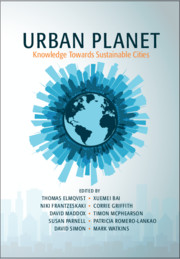In the eighteenth century, at the height of the Industrial Revolution, cities in the English Midlands were the pinnacles of technological advancement. The British Empire, served by vassal colonies, would have been the equivalent of major modern-day megalopolises such as New York and Tokyo. But failure to adapt – as, one by one, the empire lost its colonies and industries shifted elsewhere in the globe – led to the demise of once great English cities. Similar tales can be encountered in the United States (automobile manufacturers), Switzerland (watchmakers), and Germany (solar panels). How can other countries and their cities avoid a similar fate?
Climate change is one such major challenge facing several cities. Global warming is disrupting equilibrium; coastal cities, in particular, are at risk as sea level rises. People will have to reconfigure reclaimed land and design underground infrastructure, such as tunnels and submerged utilities, using climate protective measures. With many cities and towns approaching the limits of their carrying capacities and urban migration stretching resources, there is the added problem for cities of how to accommodate so many people let alone protect against the ravages of weather.
A partial solution can be offered by science and sound policies. The advanced production and distribution of food and other resources – so that a large number of the world’s projected 8.5 billion people by 2030 (UN Reference United2015) population are being fed through the efforts of a few – means that cities can yet thrive, and the construction of urban habitats and infrastructure that capitalize on economies of scale in heating, cooling, and mobility are a triumphant statement of modern urban development.
But the more science and technology come to the rescue, the more removed society becomes from appreciating nature. Plastic polymers are the epitome of the blessing and curse of science. Without plastics, from packaging to complex 3D laser printing, modern life would be almost inconceivable. Plastics are so commonplace today that they occur everywhere in our streets, countrysides, oceans, and in our food chains, where they will not break down for many decades. Society has become so imbued with consumer behavior that little thought is given to what happens after items are discarded. This is just one example of how behavior has been malformed as a result of science. Hence, science must be applied with good policies in mind to shape attitudes.
More enlightened cities these days are listening to scientists and drafting policies based on evidence instead of political populism. In tackling climate change, the C40 network of cities is an example of this type of thinking from cities worldwide. Conservation of resources makes sense, as does the protection of natural environments. The prudent use of energy and water means that current city dwellers will benefit from efficient use of resources but also that there will be enough of these resources for future generations. Investment now in renewable resources, linked with smart technologies, will result in meaningful long-term returns.
But if scientists are telling us how to get the policies right to conserve resources and execute the correct measures to address climate change, what is stopping us? A telling lack of statesmanship has dominated talks on climate change. Denial of climate change has long prevailed, spurred on by vested interests in certain sectors. The other major hurdle in solving climate change has been the lack of political will to make the hard calls, such as removal of subsidies on energy resources including oil and electricity, which garners popular sentiment, but does little good for the environment or the populace. The realization that externalities should be priced into resources such as water and energy is beyond the comprehension of most political dealers, which propels us onto our short-lived path of wanton consumption. This is not just irresponsible, but dangerous.
Science and politics should converge, even if they make uncomfortable bedfellows. Good political decisions coupled with science-based policies will “future proof” cities against climate change and other challenges.

